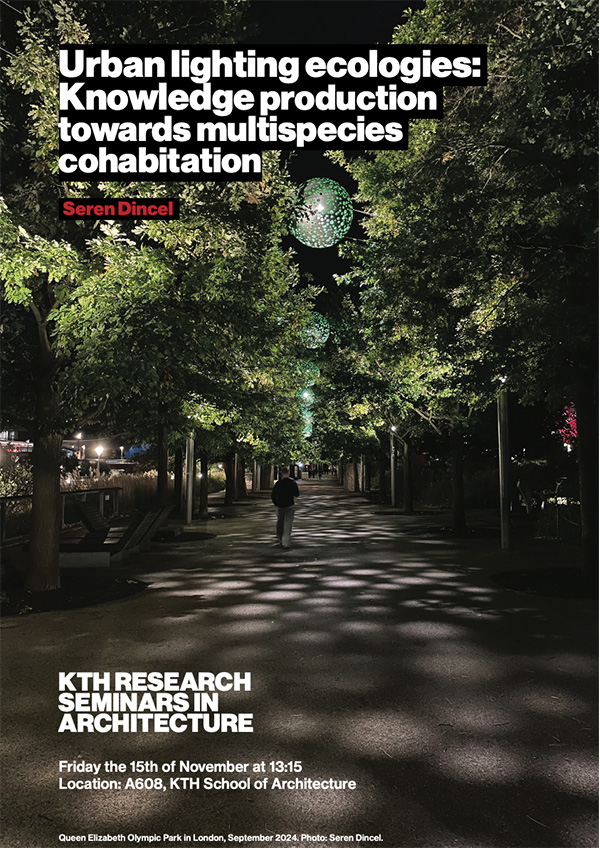Urban lighting ecologies
Knowledge production towards multispecies cohabitation

This Friday, the 15th of November, at the Research Seminars in Architecture, Seren Dincel will present her ongoing PhD Project, Urban lighting ecologies: Knowledge production towards multispecies cohabitation.
Time: Fri 2024-11-15 13.15 - 16.15
Location: Conference Room 6th Floor of the Architecture School Room A608 , KTH, Osquars backe 5
Video link: https://kth-se.zoom.us/j/67185547897
This dissertation explores ways of making lighting design, urban design, and green structures reciprocally inform each other in the formation of built environments by recognising a broader understanding of the interrelationships between species and materialities of urban life. Urban lighting technologies are artefacts that enable movements and everyday activities of people while transforming the physical form of the city and the natural rhythms of species. After-dark conditions of cities are often viewed single-handedly despite ecosystem functions being largely organised by natural light-dark cycles. The research looks at green areas as zones of encounter, an event of relation between humans and wildlife in which lighting technologies tend to trespass to ecological habitats harbouring recovery, reproduction and nurture activities. Discrepancies in planning processes and prioritisations of organisms, visions and disciplines over one another are not abiding by the biodiversity concerns of today, and it suggests transitioning from isolated perspectives towards reimagining an alternative after-dark.
To this end, the thesis investigates a reimagined practice of after-dark by studying ecology and the materiality of architecture and technology as active participants mutually interacting in processes of urban development. The methodological framework relies on theorisation, manifestation, and dialogical approaches to reveal lighting design knowledge operations in research and practice. In what way does the interaction of light with landscape structures and materials constitute spatiality to accommodate urban ecologies, and how is this knowledge positioned, interpreted and filtered in interdisciplinary planning practices in becoming concretised? Three main cases, one of which is a testbed and the other two practice-based implemented projects containing zones of encounter, have been studied from different angles and explored through prototypical experimentations, stakeholder engagements, and mapping of light qualities. All cases are in the character of an urban park located in regions of Scandinavia, Europe and the US with a particular ecological focus and pedestrian lighting system. The dissertation aims to contribute alternative ways of designing and measuring light environments for reconciling multispecies cohabitation.
The opponent for the session will be Ulrika Wänström Lindh from the University of Borås. Ulrika Wänström Lindhis a Senior Lecturer in Resource Recovery and the Built Environment at the University of Borås. With a background as a house architect, interior architect SIR/MSA, and lighting designer she focuses on issues of architecture and the user's experience in both interior and exterior contexts. The doctoral thesis Light Shapes Spaces (2012) mainly describes qualitative studies of complex spaces where many factors interact, when light shapes spaces. Central themes in Ulrika's research and teaching are size perception of space, room atmosphere, lighting and safety for pedestrians, visual guidance, and how light can affect social behaviour and interaction between people. Later studies have dealt with the perception of the uniformity of light. The goal of the research is to gain knowledge to be able to prioritize the right light in the right place and thus get more benefit from the light while saving resources.
Supervisors: Ute Besenecker, Daniel Koch and Arne Lowden (Stockholm University).
For further reading see here: Paper A , Report I and Report II .
For a copy of the full manuscript please contact Seren Dincel : dincel@kth.se
